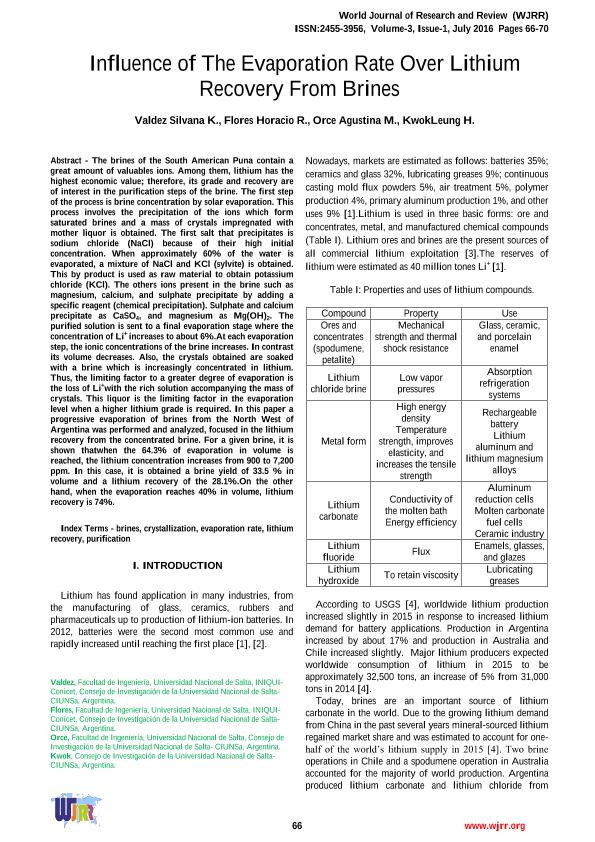Mostrar el registro sencillo del ítem
dc.contributor.author
Valdez, Silvana Karina

dc.contributor.author
Flores, Horacio Ricardo

dc.contributor.author
Orce, Agustina
dc.date.available
2018-10-18T15:09:28Z
dc.date.issued
2016-07
dc.identifier.citation
Valdez, Silvana Karina; Flores, Horacio Ricardo; Orce, Agustina; Influence of the evaporation rate over lithium recovery from brines; WJRR; World Journal of Research and Review (WJRR); 3; 1; 7-2016; 66-70
dc.identifier.issn
2455-3956
dc.identifier.uri
http://hdl.handle.net/11336/62699
dc.description.abstract
The brines of the South American Puna contain a great amount of valuables ions. Among them, lithium has the highest economic value; therefore, its grade and recovery are of interest in the purification steps of the brine. The first step of the process is brine concentration by solar evaporation. This process involves the precipitation of the ions which form saturated brines and a mass of crystals impregnated with mother liquor is obtained. The first salt that precipitates is sodium chloride (NaCl) because of their high initial concentration. When approximately 60% of the water is evaporated, a mixture of NaCl and KCl (sylvite) is obtained. This by product is used as raw material to obtain potassium chloride (KCl). The others ions present in the brine such as magnesium, calcium, and sulphate precipitate by adding a specific reagent (chemical precipitation). Sulphate and calcium precipitate as CaSO4, and magnesium as Mg(OH)2. The purified solution is sent to a final evaporation stage where the concentration of Li+ increases to about 6%.At each evaporation step, the ionic concentrations of the brine increases. In contrast its volume decreases. Also, the crystals obtained are soaked with a brine which is increasingly concentrated in lithium. Thus, the limiting factor to a greater degree of evaporation is the loss of Li+with the rich solution accompanying the mass of crystals. This liquor is the limiting factor in the evaporation level when a higher lithium grade is required. In this paper a progressive evaporation of brines from the North West of Argentina was performed and analyzed, focused in the lithium recovery from the concentrated brine. For a given brine, it is shown thatwhen the 64.3% of evaporation in volume is reached, the lithium concentration increases from 900 to 7,200 ppm. In this case, it is obtained a brine yield of 33.5 % in volume and a lithium recovery of the 28.1%.On the other hand, when the evaporation reaches 40% in volume, lithium recovery is 74%.
dc.format
application/pdf
dc.language.iso
eng
dc.publisher
WJRR
dc.rights
info:eu-repo/semantics/openAccess
dc.rights.uri
https://creativecommons.org/licenses/by-nc-sa/2.5/ar/
dc.subject
Brines
dc.subject
Evaporation Rate
dc.subject
Lithium
dc.subject
Recovery
dc.subject.classification
Otras Ingeniería Química

dc.subject.classification
Ingeniería Química

dc.subject.classification
INGENIERÍAS Y TECNOLOGÍAS

dc.title
Influence of the evaporation rate over lithium recovery from brines
dc.type
info:eu-repo/semantics/article
dc.type
info:ar-repo/semantics/artículo
dc.type
info:eu-repo/semantics/publishedVersion
dc.date.updated
2018-09-27T15:36:14Z
dc.journal.volume
3
dc.journal.number
1
dc.journal.pagination
66-70
dc.journal.pais
India

dc.description.fil
Fil: Valdez, Silvana Karina. Consejo Nacional de Investigaciones Científicas y Técnicas. Centro Científico Tecnológico Conicet - Salta. Instituto de Investigaciones para la Industria Química. Universidad Nacional de Salta. Facultad de Ingeniería. Instituto de Investigaciones para la Industria Química; Argentina
dc.description.fil
Fil: Flores, Horacio Ricardo. Consejo Nacional de Investigaciones Científicas y Técnicas. Centro Científico Tecnológico Conicet - Salta. Instituto de Investigaciones para la Industria Química. Universidad Nacional de Salta. Facultad de Ingeniería. Instituto de Investigaciones para la Industria Química; Argentina
dc.description.fil
Fil: Orce, Agustina. Universidad Nacional de Salta. Facultad de Ingenieria; Argentina
dc.journal.title
World Journal of Research and Review (WJRR)
dc.relation.alternativeid
info:eu-repo/semantics/altIdentifier/url/https://www.wjrr.org/download_data/WJRR0301093.pdf
Archivos asociados
